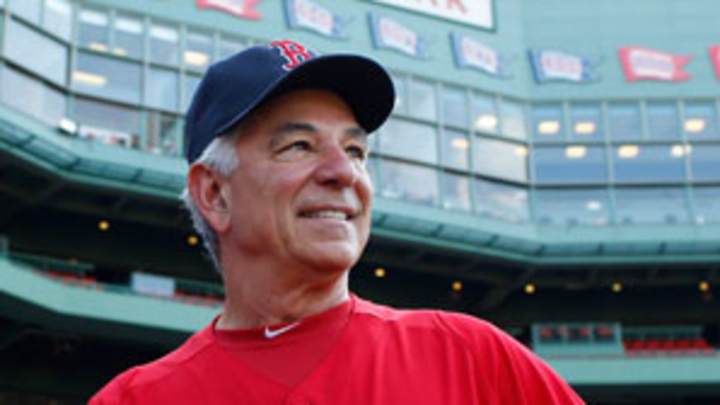Valentine isn't to blame for the Red Sox' struggles

Despite all the drama, Bobby Valentine and the Red Sox are just 3 1/2 games out of a playoff spot. (US Presswire)

Last week was fairly typical of the Red Sox' season. Coming off the high of winning four in a row against the Yankees (in the Bronx) and Tigers (at Fenway), the team once again appeared to be turning the corner. Then they lost the series finale against Detroit and dropped three more in a row against the lowly Twins, though they avoided a sweep with a victory on Sunday. On Monday, before the Red Sox moved back to .500 by routing the Rangers, a new round of speculation circulated regarding manager Bobby Valentine's job security, one that eventually led principal owner John Henry to issue a public vote of confidence via a written statement, which read in part:
"To blame Bobby Valentine for the Red Sox being .500 at this point in the season is simply wrong. A lot has been written about injuries to key players this year. The impact of that on the Sox this year should not be discounted.
"In baseball, managers often get too much credit and too much blame for what happens on the field. That seems to be a constant. There is often the thought in organizations, 'This isn't working so the manager needs to go.' But an organization is much more than the field manager. We all share responsibility for the success and failure of the Boston Red Sox. We are not making a change in manager.
For all of the reports of disharmony in the Boston clubhouse — and there have been plenty — and the manager's role in those situations, the extent to which the Red Sox season has been affected by injuries shouldn't be understated. According to the injury accounting at Baseball Prospectus, the Sox are runaway leaders both in terms of the number of games their players have missed due to stints on the disabled list, and the percentage of payroll lost in the process (all dollar figures in millions):
Team | Games Missed (Rank) | DL Salary | Total Payroll | Lost to Injury |
|---|---|---|---|---|
Red Sox | 1234 (1) | $71.7 | $175.2 | 40.9% |
1117 (2) | $17.0 | $55.6 | 30.6% | |
A's | 734 (9) | $15.2 | $53.5 | 28.5% |
826 (6) | $25.9 | $93.0 | 27.9% | |
594 (15) | $25.7 | $94.5 | 27.2% | |
747 (8) | $23.1 | $84.9 | 27.2% | |
626 (12) | $20.7 | $80.2 | 25.9% | |
863 (5) | $44.0 | $172.1 | 25.6% | |
525 (19) | $22.6 | $110.5 | 20.4% | |
898 (4) | $18.8 | $94.6 | 19.9% |
Through Sunday, the Sox had lost more than 40 percent of their payroll to date via injuries, where only one other team has lost more than 30 percent. Only one of their 13 highest-salaried players has avoided the DL, with several spending months there:
Player | Salary | Games Missed | WARP |
|---|---|---|---|
$21,857,143 | 0 | 2.0 | |
$20,357,143 | 89 | 0.1 | |
Josh Beckett | $17,000,000 | 16 | 0.8 |
$15,950,000 | 109 | -- | |
$14,575,000 | 20 | 3.0 | |
Kevin Youkilis | $12,250,000 | 22 | -0.2 |
$10,333,333 | 88 | 0.1 | |
$8,250,000 | 11 | 0.4 | |
$8,050,000 | 79 | 0.1 | |
$7,630,000 | 14 | 0.9 | |
Bobby Jenks | $6,000,000 | 80 | -- |
Andrew Bailey | $3,900,000 | 109 | -- |
$3,750,000 | 20 |
While I've included those players' largely unimpressive Wins Above Replacement Player totals in that table, it doesn't capture the underperformance that may have resulted from players due to playing hurt, something that has likely been a factor for Pedroia (.267/.324/.409 while battling a thumb injury), Youkilis (.233/.315/.377 while battling back woes before being traded to the White Sox in late June), Beckett (4.54 ERA while missing time due to shoulder inflammation; note that the accounting doesn't include turns skipped or starts shortened by non-DL injuries) and others. All told, the players above, who account for just shy of $150 million worth of the team's payroll have missed 657 games — over half of the team's total — and accumulated an unremarkable 7.2 WARP when available. Ortiz is still on the DL; he underwent a painkiller injection for his strained right Achilles on Monday, and figures to miss at least a few more days. Matsuzaka is on a rehab assignment, as is Bailey, who has yet to pitch for the Red Sox due to a thumb injury, and who has just three minor league appearances under his belt thus far.
For all of that, injuries only go so far when it comes to explaining the team's season, particularly when Boston ranks second in the league in scoring at 4.90 runs per game. The team is fourth in the AL East at 55-55 despite outscoring opponents 539-503. That +36 run differential ranks second in the division behind the Yankees (+87), with the Rangers (+76), White Sox (+66) and Angels (+53) the only other AL clubs that have outdone the Sox; all of them are at least eight games over .500. According to Baseball Prospectus, the Red Sox' record is 3.6 wins short of what it should be based upon their runs scored and runs allowed (their Pythagorean record) — the second-largest margin in the league, better than only the Mariners (-3.9).
On Monday I showed how the Orioles have managed to remain six games over .500 despite a −57 run differential; they're on a record-setting 21-6 pace in one-run games, have the majors' best record in one- and two-run games, and are below .500 in games decided by five or more runs. The Red Sox are something of the flip side of that story:
Team | 1-run | 1- and 2- run | Low-Run Dif | 5+ run | Blowout Dif |
|---|---|---|---|---|---|
Orioles | 21-6 (.778) | 37-17 (.685) | 25 | 13-19 (.406) | -54 |
Red Sox | 11-13 (.458) | 23-27 (.460) | -6 | 19-12 (.631) | 50 |
As in comedy, timing is everything when it comes to scoring and allowing runs. In 50 games — nearly half their schedule — the Red Sox have been outscored by a grand total of six runs, and are four games below .500. In 31 other games, they have outscored opponents by 50 runs but are just seven games above .500. Where I noted that a good deal of the Orioles' overperformance in close games is owed to a bullpen with the league's third-best ERA (3.14), at first glance the Sox haven't been that much worse in that department (3.35). But once inherited baserunners are accounted for via BP's Fair Run Average, the gap between the two bullpens becomes bigger, with Baltimore at 4.23 (sixth) and Boston at 4.82 (13th). Furthermore, the Sox' rotation has been worse than the O's in terms of both ERA (4.78 versus 4.65) and Fair Run Average (5.23 versus 4.82).
Some of that can be laid on Valentine, whose job it is to deploy the relievers he has been given to best effect. But with designated closer Bailey injured, and backup closer Mark Melancon a flaming car wreck (7.46 ERA in 25 1/3 innings) to such an extent that he spent nearly two months months in Triple-A, Valentine has been forced to turn to the less-experienced Alfredo Aceves. His performance in the ninth inning job has been rocky at best: a 4.29 ERA (fifth-highest among pitchers with at least 10 saves), and six blown saves in 29 opportunities, five of which turned into losses. It's on general manager Ben Cherington to find better alternatives for Valentine if the current options aren't working.
That goes for the rotation as well. Despite any reports of personality conflicts, it's unfair to pin the underperformances of starters Beckett, Lester (5.36 ERA) and Buchholz (4.48) entirely on Valentine, particularly as those pitchers had seasons where they underperformed for predecessor Terry Francona. They're talented but inconsistent hurlers who spend half their time in a very tough ballpark and a good chunk of their season in other tough parks such as Yankee Stadium and Camden Yards. Furthermore, Valentine had nothing to do with the signing of Matsuzaka who put up a 6.65 ERA in five starts after returning from Tommy John surgery, nor did he convert setup man Daniel Bard to the rotation, where he was lit up for a 5.24 ERA before control problems forced him to the minor leagues.
Blaming the manager or head coach for a team's problems is the most common reflex in all of sports; as the saying goes, it's easier to fire one manager than it is to fire 25 players, and teams fire managers all the time when things don't worok out. Earlier this summer, I boldly predicted that the Sox would surge if they dismissed Valentine, who has often seemed out of place managing a major league team for the first time since 2002. That was based more on the tendency of underperforming players to move toward their established levels of performance regardless of the manager than any kick in the pants or pat on the shoulder a new skipper might have applied — which isn't to say that such interpersonal dealings aren't a huge part of a manager's job.
Even given that prediction, the weight of the evidence backs Henry's statement. Valentine shouldn't carry the blame for the Red Sox sluggish showing. That's on the players and the men who assembled this team.
Thanks to Dan Turkenkopf of Baseball Prospectus for data assistance.
